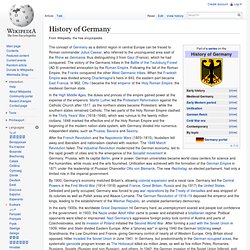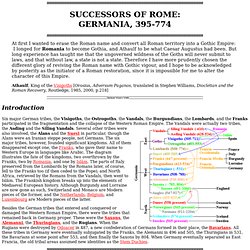

History - Europe - Northern. Kingdoms of Northern Europe - Jutes (Eudoses) Jutes (Eudoses) By the time of the late Roman empire, the Indo-European Germanic Jutish tribes are thought to have replaced the earlier Germanic Cimbri peoples in modern northern Denmark, migrating there from along the German Baltic coastline from the direction of Poland.

Their territory in Jutland probably stretched as far south as the River Kongeaen in central Denmark, beyond which was the domain of the Angles. They may also have absorbed elements of the Charudes tribe, which had occupied areas of north-western Denmark in the first century AD. The Jutes (a modern form of the name) are first mentioned by Tacitus (Germania) about AD 98, where they are referred to as the Eudoses. History of Germany.
The concept of Germany as a distinct region in central Europe can be traced to Roman commander Julius Caesar, who referred to the unconquered area east of the Rhine as Germania, thus distinguishing it from Gaul (France), which he had conquered.

The victory of the Germanic tribes in the Battle of the Teutoburg Forest (AD 9) prevented annexation by the Roman Empire. Following the fall of the Roman Empire, the Franks conquered the other West Germanic tribes. When the Frankish Empire was divided among Charlemagne's heirs in 843, the eastern part became East Francia. GERMANIA: Visigoths, Ostrogoths, Vandals, Vikings, Orkney, etc. At first I wanted to erase the Roman name and convert all Roman territory into a Gothic Empire: I longed for Romania to become Gothia, and Athaulf to be what Caesar Augustus had been.

But long experience has taught me that the ungoverned wildness of the Goths will never submit to laws, and that without law, a state is not a state. Therefore I have more prudently chosen the different glory of reviving the Roman name with Gothic vigour, and I hope to be acknowledged by posterity as the initiator of a Roman restoration, since it is impossible for me to alter the character of this Empire. Athaulf, King of the Visigoths [Orosius, Adversum Paganos, translated in Stephen Williams, Diocletian and the Roman Recovery, Routledge, 1985, 2000, p.218] Introduction.